Annual Report 2023
TABLE OF CONTENTS
Our Mission
UNCF envisions a nation where all Americans have equal access to a college education that prepares them for rich intellectual lives, competitive and fulfilling careers, engaged citizenship and service to our nation.
UNCF’s mission is to build a robust and nationally recognized pipeline of underrepresented students who, because of UNCF support, become highly qualified college graduates and to ensure that our network of member institutions is a respected model of best practices in moving students to and through college.
UNCF’s North Star is to increase the total annual number of African American college graduates by focusing on activities that ensure more students are college-ready, enroll in college and persist to graduation. This is done through a three-pillar strategy:
• Positioning member institutions as a viable college option for students and investing in institutional capacity to improve student outcomes.
• Creating transformational support programs to ensure that students are enrolling and persisting through college completion.
• Building awareness of educational attainment and cultivating college-going behaviors within the African American community.
Our Momentum toward Growth Continues
A Message from the Chair of the Board and the President and CEO Dear Friend, Welcome to UNCF’s 2023 fiscal year Annual Report. We are thrilled to report that UNCF had a record-breaking performance. Our fundraising total gifts exceeded $360 million—a record for total donations in a single fiscal year in UNCF’s history. Over the past three years, UNCF has raised more than $800 million to support HBCUs and the students they serve through scholarships, emergency student aid, scholarship endowments and capacity building for UNCF-member institutions. And over the last 10 years, we have awarded $1 billion in scholarships to more than 100,000 students. Undoubtedly the biggest news of fiscal year 2023 was the Fidelity Scholars Program, which you will learn more about in this annual report. On Jan. 17, 2023, UNCF received its largest single corporate gift in its history. Fidelity Investments donated $190 million to UNCF to create a social impact scholarship for the “mighty middle,” those students with 2.5 to 3.5 GPAs who are not often highly recruited candidates for elite schools and therefore wouldn’t otherwise benefit from a program like this one. Under the program, up to 2,500 underrepresented students of color in 11 states will receive full scholarships and wrap-around services needed to ensure their success. In this fiscal year, UNCF’s Direct Response Program again showed its extraordinary fundraising power and resilience by generating $13.67 million from individual donors through our direct mail and online engines. This was made possible by the generosity and steadfast support of 158,000 individual donors. Thanks to this strong donor support and dedicated UNCF team, we continue to deliver on our unwavering mission. As we look ahead, we are determined more than ever to continue building a robust and nationally recognized pipeline of African American students in ways that help them become highly qualified graduates and leaders in our society. Yet, we still have a lot of work to do. Three record-setting years of fundraising does not erase decades of societal struggle. Despite the challenges facing our students and HBCUs in fiscal year 2023, thanks to you, our loyal supporters, partners and donors, UNCF remains steadfast. This annual report highlights several of the amazing accomplishments we have achieved with your help. As you peruse this report, you’ll read stories that clearly demonstrate how HBCUs fuel the American middle class and elevate the social mobility of Black students, mostly first-generation and from low-income families. Discover how UNCF is reimagining online education with HBCUv™, a shared online platform where students, educators and staff are enabled to learn, develop and build community from anywhere. Once developed, HBCUv™ will offer best-in-class remote education, community engagement and career pathways to students seeking an HBCU education. Learn how we partnered with the Thurgood Marshall College Fund and Blue Meridian Partners to launch a landmark collaboration to drive tangible, long-term progress across HBCUs and impact the Black economy. Called the “HBCU Transformation Project,” the first-of-its-kind collaboration aims to increase HBCU sustainability, improve student outcomes in retention and graduation rates, expand enrollment and increase capacity building with faculty and staff. You can learn more about supporters like educator Dr. Blondean Y. Davis who for decades has raised money to support the work of UNCF and students of color to fulfill their dreams of attending college. Read stories about financial support UNCF received in fiscal 2023 from several of our corporate partners including Fidelity Investments, Blue Meridian Partners, Ralph Lauren and The Gray Foundation. And, we’re also featuring a story about a collaboration between UNCF and renowned video game publisher EA Madden that created a scholarship program supporting and empowering aspiring students interested in pursuing careers in the gaming industry. As you read these and other articles within this annual report, know that the investment of your talent, time and treasure is greatly appreciated and valued. We need your continued support to help us transform and fuel HBCUs to develop the future generation of diverse, American college-educated talent to lead us all to better futures. Finally, whether you’ve invested in UNCF’s schools and students for years, or this is the first time you’re considering joining us, let our years of success inspire you to make our indelible motto, “A mind is a terrible thing to waste”® , your own. Sincerely,
IMPACT
Fidelity Investments Changes the Landscape for Students of Color via Largest Corporate Gift in UNCF’s History
Part of its long-standing commitment to financial education and inclusion, Fidelity donated $190 million to UNCF. The gift was part of its overall $250 million Invest in My Education (ME)℠ initiative. Launched in early 2023, the social impact program was built by Fidelity and its philanthropic partners and provides access to education and ongoing support to students from underrepresented populations and historically underserved communities who have faced systemic barriers and challenges to economic mobility. It intends to reach 50,000 students across five years.
“Invest in My Education upholds Fidelity’s most fundamental value—to empower individuals to strengthen and secure their financial futures,” said Pamela Everhart, head of regional public affairs and community relations, Fidelity Investments. “By taking a unique, long-term and holistic approach, Invest in My Education has the potential to support economic mobility for up to 50,000 students over the next five years—and that is really just the beginning.”
To inform the work and connect resources with the students and communities most in need, Fidelity engaged several strategic partners including UNCF.
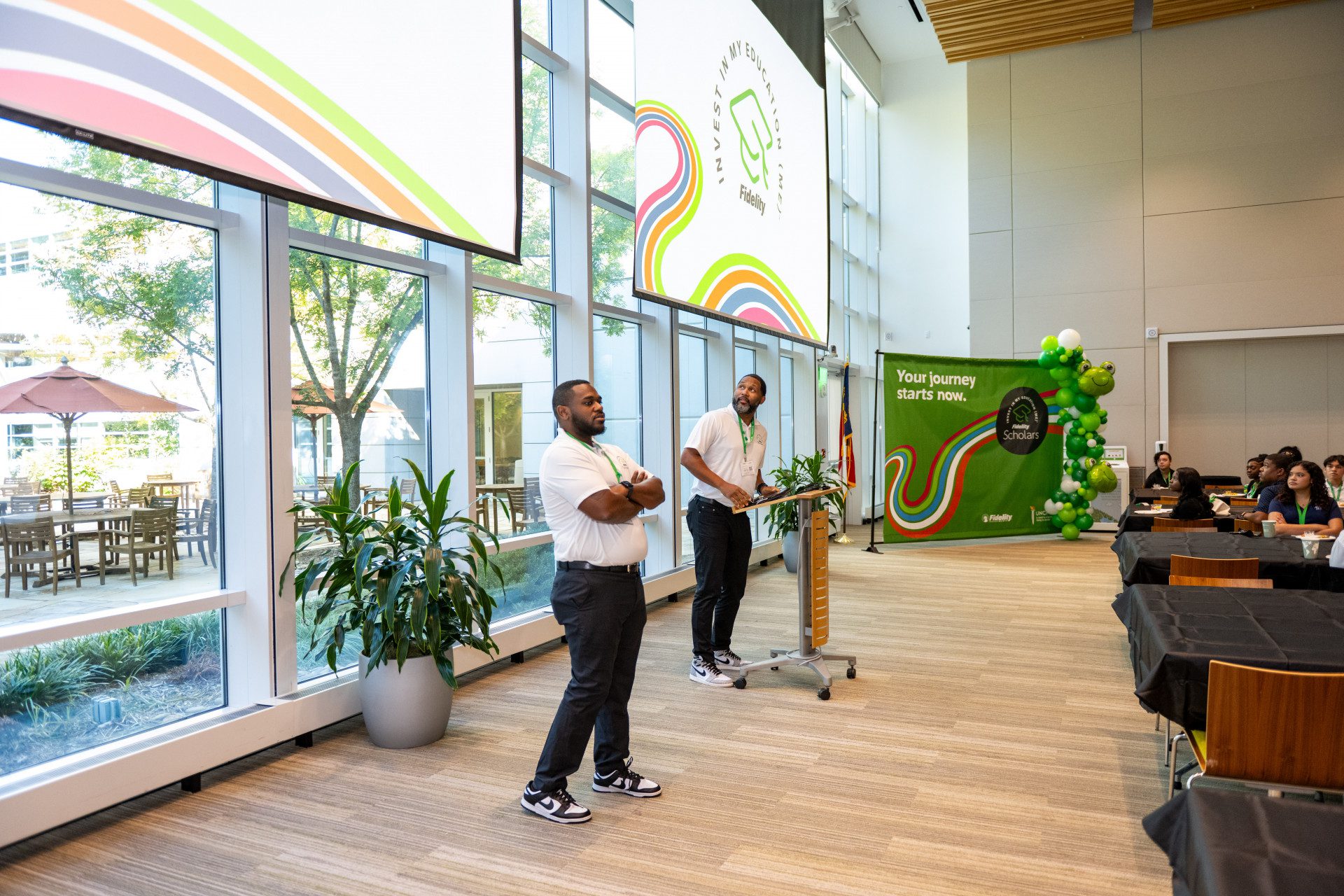
“This is an incredibly generous gift from Fidelity Investments,” said Dr. Michael L. Lomax, president and CEO, UNCF. “We are delighted to partner with a premier global financial services company to do this work. The Fidelity Scholars Program is exemplary, innovative and demonstrates the company’s commitment to provide equal educational opportunities for low-income and underrepresented students who do not have the advantages of other students.”
The program is consistent with UNCF’s mission as the nation’s largest private scholarship provider to students of color, administering an array of small and large scholarships that have helped more than 500,000 students to earn college degrees with the support of institutional philanthropic partners and individual donors.
“Fidelity’s extraordinary gift will encourage other corporate leaders to get involved and show their commitment for the education of bright, promising student scholars who simply need the financial resources and support services to achieve their college and career aspirations,” said Milton H. Jones, Jr., chairman, UNCF Board of Directors.
The Fidelity Scholars Program features annually renewable, need-based, last-dollar scholarships with comprehensive wrap-around support services for eligible students.
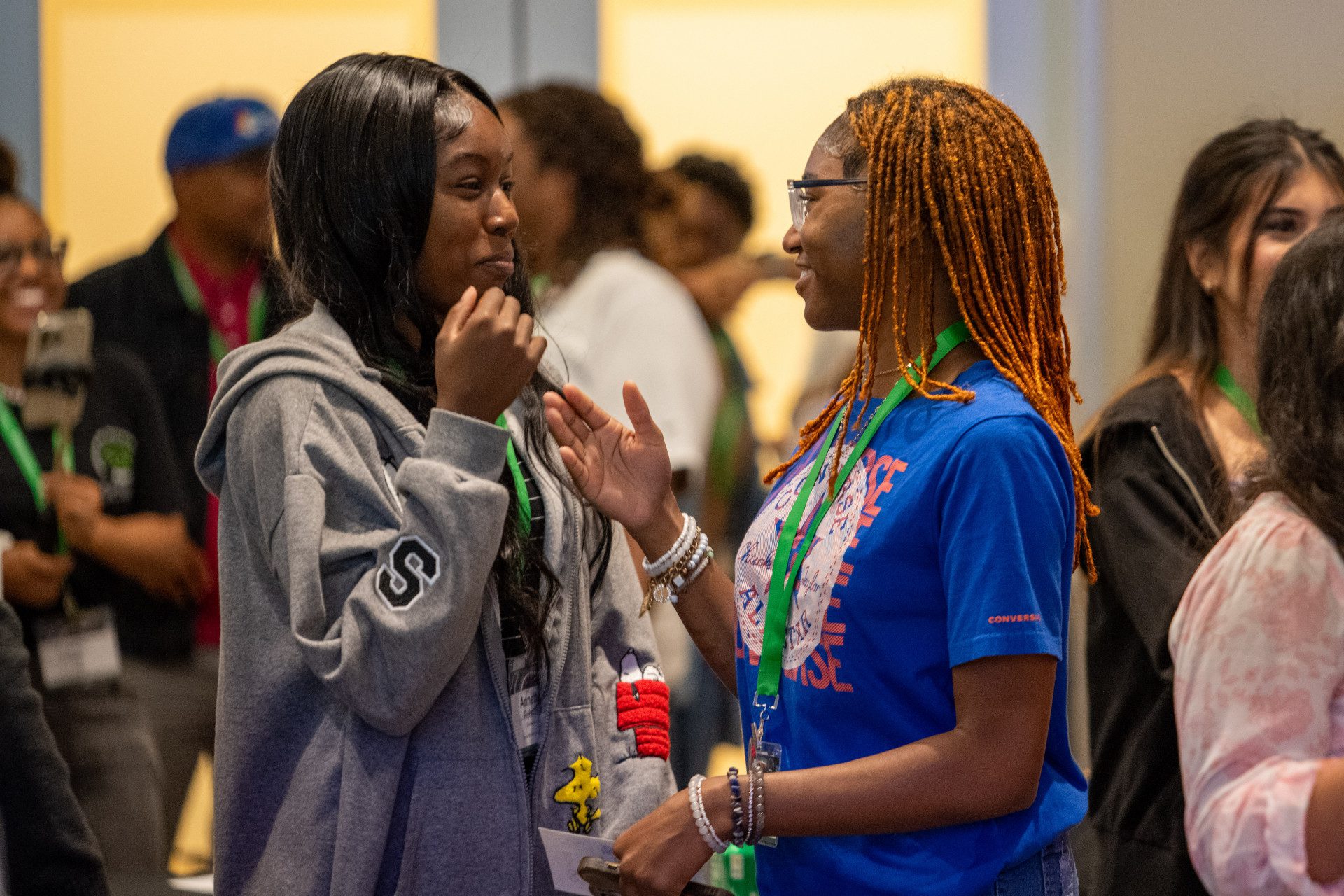
“The design of this program is specifically geared to the mighty-middle, students with 2.5 to 3.5 grade point averages, who are often overlooked for scholarship opportunities and need significant financial support,” noted Larry Griffith, executive vice president, programs and student services, UNCF. “This is not a transactional program, but a transformational program giving striving achievers a substantive scholarship and a comprehensive set of services based on research and best practices that UNCF has developed over the last 79 years.”
Student participants must pursue a bachelor’s or an associate degree at an accredited not-for-profit, four-year or two-year college or university, (including minority serving institutions (MSIs) and historically Black colleges and universities (HBCU)s, or a not-for-profit certificate program within the state of their residence. The program also covers the cost of certain certificate and training programs.
“As a UNCF-HBCU president, I am confident that this program will have major impact on HBCUs and minority-serving institutions of higher education,” said George T. French, Jr., Ph.D., president of UNCF-member Clark Atlanta University and chair of UNCF’s member presidents. “The participating colleges and universities include HBCUs, state-funded, small private schools and community colleges that do the heavy lifting, but don’t often have the financial resources to support their students.”
In September 2023, the Fidelity Scholars Program hosted orientation sessions for students in Massachusetts, Texas and North Carolina for the 200 students that comprised the inaugural class of scholars. The agenda included program expectations, mentoring, leadership, financial aid and health and wellness workshops. Students also met and interacted with their Fidelity mentors and college success coaches.
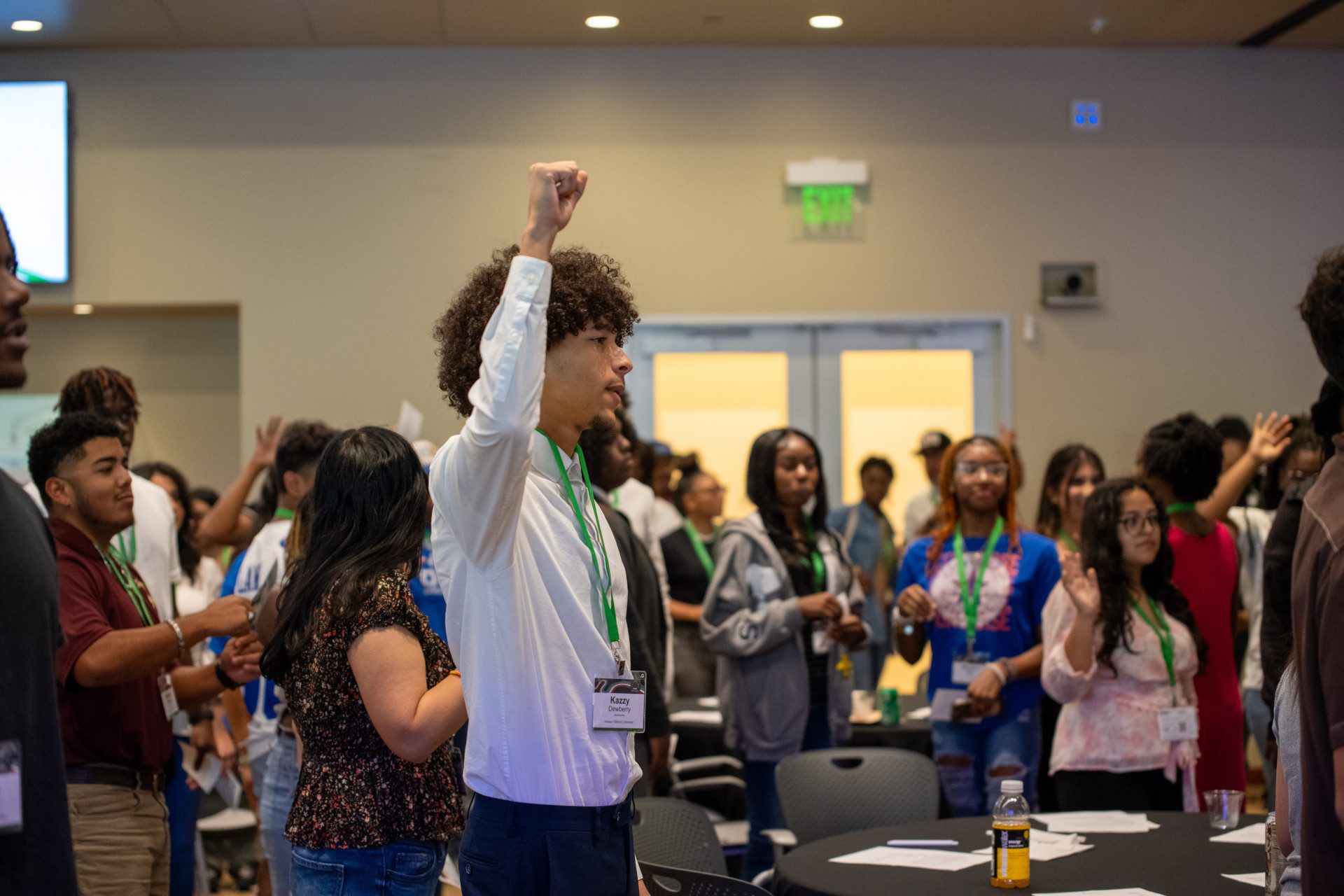
In the fall of 2023, the program expanded to Florida, New Jersey, New Mexico and Washington, DC. Over the next five years, the Fidelity Scholars Program will provide funding and support for more than 2,500 talented students in areas where Fidelity has a significant presence across the country.
“Fidelity Investments is providing an unparalleled opportunity for some of the most deserving, overlooked and vulnerable students to graduate with little to no college debt,” said Paulette Jackson, senior vice president, national development and operations, UNCF.
This philanthropic milestone is a sterling example of how UNCF and its corporate partners are helping to achieve better futures for historically underrepresented and underserved students.
IMPACT
Wakanda Forever!!! HBCUs Forever!!!
Hidden deep in the forest, this isolated Third World country was only known by its people; and behold, this isolated African nation is a technologically advanced wonder. Technology so superior, the people of Wakanda believed they needed to protect it from the rest of the world.
And now with the release of the “Black Panther: Wakanda Forever” movie, the people of Wakanda have decided to share their advanced technology with people outside of their country. They are on the precipice of telling the world who they are, why they matter and why everyone else should pay attention to them.
That is precisely the moment historically Black colleges and universities (HBCUs) find themselves in today.
There were the murders of George Floyd and Breonna Taylor in 2020, the racial and social unrest that followed and tragedies that befell so many others—but we still are inspired by their memories. People began looking beyond the trees and started viewing HBCUs in a different manner.
However, that’s not new to those of us who are HBCU alums and advocates for these exceptional institutions.
Even when others, even those in our community, approached HBCUs from a deficit narrative and thought only state flagships and Ivy Leagues had value in changing society, we held true to their value of wanting and specializing in educating the progeny of slaves no matter their economic situation.
Welcome home.
We’ve always approached them as institutions going from strength to strength, even if the areas where HBCUs are strong differ from other types of institutions.
That’s our belief and commitment at UNCF (United Negro College Fund) as we approach our 80th anniversary in 2024.
We’re not solely advocating for 101 institutions; we’re advocating a position that HBCUs should be prominent in the discussion about the future of all higher education in America.
Without question, HBCU fever, like Wakanda Forever fever, is rampant. Whether it's Georgia gubernatorial candidate Stacy Abrams dancing the “Electric Slide” at the “Spel-House” homecoming, or actress Angelina Jolie hanging out with her daughter at Spelman, or Coach Deion “Prime” Sanders leading his undefeated Jackson State University football team on to the battlefield to the hip hop song, “Here I Go,” by Mystical, HBCU homecomings are off-the-chain.
And for good reason.
While most colleges and universities are experiencing declining enrollment, online schools and HBCUs see increases, based on a recent report from the National Student Clearinghouse.
College enrollment dropped for the third consecutive school year after the start of the pandemic, dashing universities’ hopes that a post-Covid rebound was at hand.
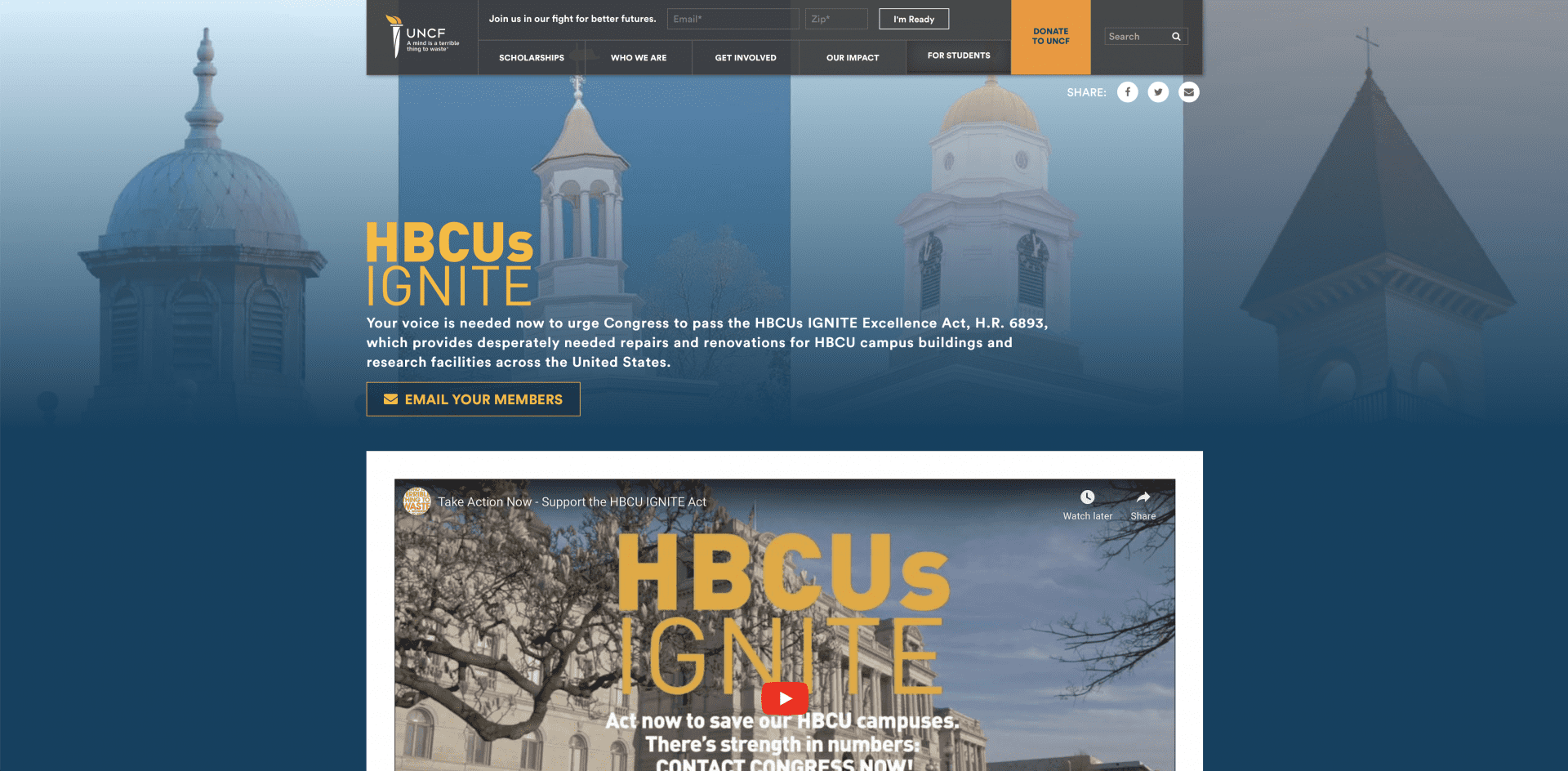
HBCUs saw an enrollment uptick of more than 6% among freshmen.
And not surprising. No institutions of higher learning can do what HBCUs do for Black students: producing 80% of America’s Black judges, 50% of the country’s Black doctors and 50% of its Black lawyers.
Again, welcome home.
While totaling only 3% of all colleges and universities, UNCF institutions and other historically Black colleges and universities are highly effective, awarding 15% of bachelor’s degrees, 5% of master’s degrees, 10% of doctoral degrees and 19% of all STEM degrees earned by Black students in higher education.
HBCUs have a 34% mobility rate of moving their students from the bottom 40% in household income into the top 60%. This is double the national average and five times more than Ivy institutions.
And yet, unlike the producers and corporate sponsors of “Black Panther: Wakanda Forever,” who get richer by the hour, HBCUs remain chronically underfunded.
In that spirit, I am making a call to action to HBCU alumni, fans and supporters not only to wear the HBCU hoodies, sweatshirts and tee-shirts, like they wear the Wakanda Forever and Black Panther paraphernalia but to increase your spending with HBCUs with the same enthusiasm as you do Black Panther.
Enjoy the tailgate parties at homecoming, but don’t shortchange your alma mater in donations and charitable gifts.
These very real institutions need your support to improve infrastructure and innovate to offer the best possible learning experience for their students, and they need your support.
Another major way you can support HBCUs is to join UNCF (United Negro College Fund) in our advocacy efforts to get Congress to pass the HBCUs IGNITE Excellence Act, H.R. 8803. This bill is the most important single piece of legislation for HBCUs before this Congress, and it must be passed by both the House and Senate prior to adjournment.
The bill would require the U.S. Department of Education to disperse grants for constructing new campus buildings, expanding broadband access, and acquiring research and instruction equipment specifically at historically Black colleges and universities (HBCUs) and qualifying minority-serving institutions (MSIs), such as Hispanic-serving institutions (HSIs) and Asian American- and Native American Pacific Islander-serving institutions.
The time is now for Democrats and Republicans to join us and pass this bill, just as they worked together to pass the FUTURE Act in 2019.
Wakanda Forever!!! HBCUs Forever!!!
And to those who are starting to understand our value – on behalf of all HBCU alums, welcome home. We belong to you, too.
Lodriguez Murray is senior vice president, public policy and government affairs, UNCF (United Negro College Fund), the nation’s largest private provider of scholarships to minority students.
IMPACT
Healthy Minds are a Priority: Promoting Mental Health and Wellness of Black College Students
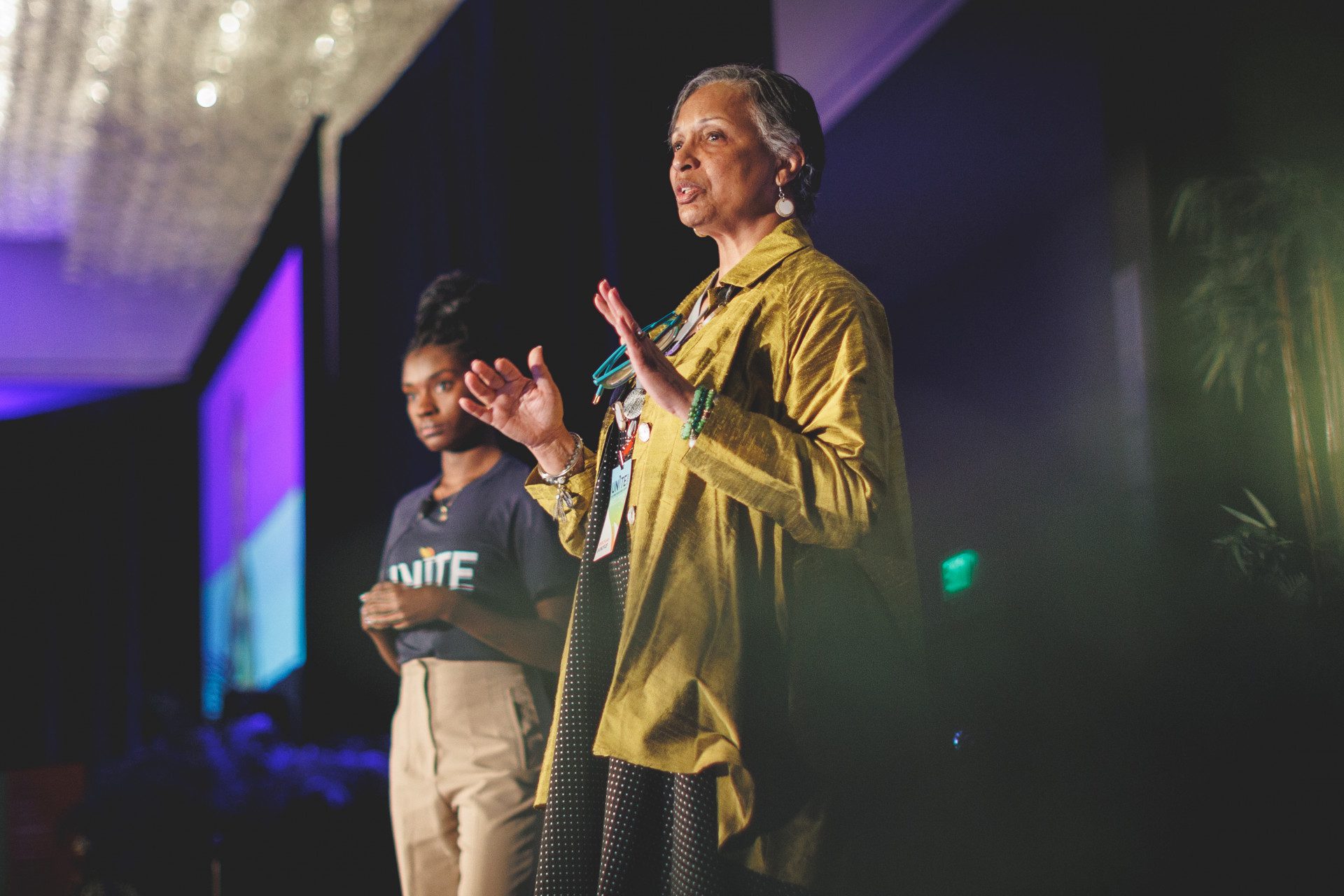
Dr. Jan Collins Eaglin (right) of The Steve Fund joins UNCF ICB’s Victoria Smith, Esq., to announce the launch of the Black College Mental Health Community of Action during UNITE 2022 in Atlanta, GA. Photo Credit: Andrew Huth
To address this situation, UNCF established a partnership with The Steve Fund, the nation’s leading organization focused on promoting mental health and emotional well-being of young people of color.
Through the partnership, UNCF and The Steve Fund launched a newly established mental health initiative with customized strategies, content, programs, resources and events all designed to build knowledge and establish a community of action around mental health and emotional well-being of students, faculty and staff on HBCU and PBI campuses.
The partnership kicked off with a survey to announce the new initiative, which was distributed to HBCU students, faculty and staff to gauge the state of mental health on HBCU campuses. The organization received responses from 342 students and 419 faculty and staff representing 47 HBCUs. Among the findings:
- Students, faculty and staff all agree the top three mental health concerns for college students are: stress, anxiety and depression.
- More than 65% of students shared that in a mental health crisis, they are most likely to speak to friends or family members.
- While 83% of students believe their campuses are addressing mental health and well-being, 45% of students surveyed said they would not speak to anyone if they were in a mental health crisis.
- An overwhelming majority of students, faculty and staff shared that they would like to keep informed on resources about mental health and well-being, yet 25% of faculty/staff shared there is no training available about student mental health and wellness.
- 72% of students are aware of their options for mental health counseling through their college/university, but only 52% feel comfortable visiting the university counseling center when a mental health issue arises.
“The Steve Fund is working to position UNCF students to achieve optimal mental health by equipping them with the skills, tools and knowledge they need to thrive as young adults, scholars and leaders,” said Dr. Annelle Primm, senior medical director at The Steve Fund. “Through our collaboration with the UNCF, the Steve Fund expands its important partnership with higher education to foster the emotional well-being of students of color through productive dialogue, effective policies and successful promotion of access to potent, culturally salient resources. It is imperative that the Steve Fund supports HBCUs in their critical mission. Our partnership in the mental health initiative is a strategic investment which will enhance cultivation of student potential and success.”
The objectives of the new partnership are to:
- Reduce stigma and promote knowledge, dialogue and awareness around the mental health needs of HBCU and PBI students
- Engage HBCU campus leaders and mobilize a commitment to prioritize mental health support systems and services on their campuses
- Provide curated mental health recommendations to help HBCU and PBI administrators support their students
- Support HBCU and PBI institutions in their vitally important mission by assisting them as they promote student potential and success
- Provide the necessary tools, resources and supports HBCU and PBI students need to remain or become mentally well so they can advance their personal goals to matriculate through college and become the future leaders of tomorrow
“COVID-19 revealed just how much infrastructure and additional staff are needed to adequately support students, faculty and existing staff on HBCU campuses. We already know that the students we serve and their educators must respond to generational trauma, racism and disinvestment to thrive—each of these challenges takes a toll on student and faculty mental health. Our schools and institutions need support to develop new and sustainable ways to provide care, mentorship and compassion to students, staff and community members,” said Dr. Michael L. Lomax, president and CEO, UNCF. “Through this partnership with The Steve Fund, we will begin to develop programs and resources that will aid HBCUs in creating an environment conducive to mental health and the emotional well-being of students.”
INNOVATE
UNCF and EA Madden Scholars Aiming to Take Gaming Industry to Next Level
On March 23, 2023, more than 20 students who received EA Madden scholarships went to EA Orlando for a full day of behind-the-scenes action, showcasing how the EA SPORTS™ team builds some of the most popular games in the world, celebrating the students and highlighting the many opportunities available to them.
The inaugural class of 24 student scholars came from 12 historically Black colleges and universities (HBCUs), including UNCF-member institutions Clark Atlanta University and Tuskegee University to tour EA SPORTS. Other student scholars joining the tour came from Florida A&M University, Grambling State University, Hampton University, Howard University, Jackson State University, Morehouse College, North Carolina A&T State University, Morgan State University and Southern University and A&M College.
EA SPORTS and franchise leaders welcomed students to the studio, sharing more about their unique career paths at EA and providing insights how EA games get designed, developed, and enhanced for players around the world.
The EA Madden Scholarships celebrate Coach Madden and his legendary career in sports and entertainment and are a key part of Electronic Arts’ John Madden Legacy Commitment to Education. John Madden’s son, Mike Madden, even surprised the students with a personal welcome video that underscored how proud he and the entire Madden family were of the students and underscored his family’s lifelong dedication to learning.
Madden Championship series analyst @OneGreatUser also joined in the day’s activities and helped share his excitement for the game with all the students. In addition to building popular TikTok and Twitch followings, @OneGreatUser has climbed the Madden ranks over the years, including capturing the Panthers Club Championship at EA headquarters in Redwood Shores, CA, in Madden 20.
One of the day’s memorable highlights was a personal guided tour of the Broadcast Studio, Motion Capture (MoCap) Studio and Art Lab at EA Orlando. The world-class creative facilities help EA game developers to build unique and intensely realistic in-game experiences. EA’s Black Employee Resource Group, BEAT!, also entertained the students through an inspirational session that culminated with an impromptu jam to "The Swag Song," which provided lots of laughs and many insightful questions.
EA SPORTS’ Orlando studio is located in the heart of downtown Orlando’s Creative Village, an urban innovation district designed to cultivate synergies between the region’s emerging digital media industry and partners in education.
This initiative allows the studio to give back to the community and support the next generation of talented individuals in the gaming industry. By partnering with UNCF, an organization dedicated to providing access to higher education for underrepresented students, EA is ensuring that deserving students, regardless of their financial circumstances, can pursue better futures.
INNOVATE
The HBCU Effect is Real
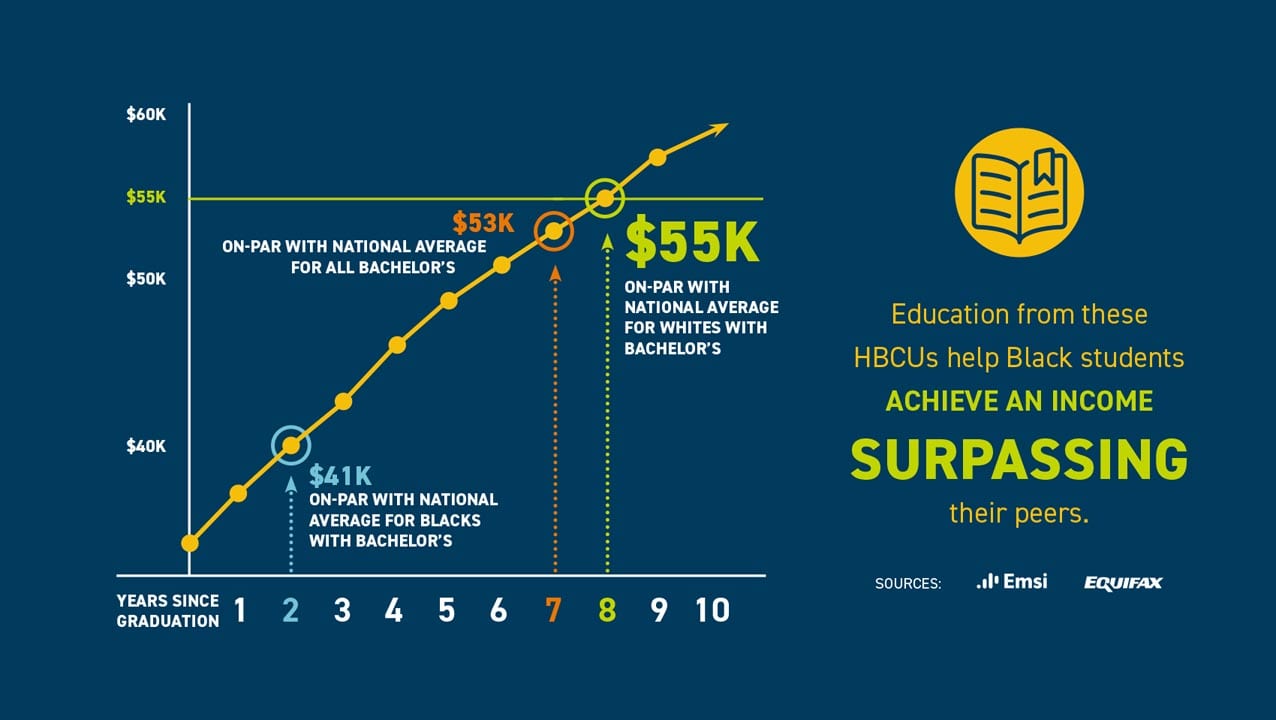
UNCF’s Frederick D. Patterson Research Institute (FDPRI), the nation’s leading research authority on HBCUs, has continued its research on “The HBCU Effect™” to validate the purpose and significant impact of HBCUs.
“The HBCU Effect™ aims to become the authoritative source for philanthropists, educators, students, reporters and all others researching the latest information about the success of HBCU students, faculty members, the institutions themselves, and by extension, their impact on the future of the U.S. and the broader global community,” said Dr. Nadrea R. Njoku, assistant vice president, FDPRI, UNCF.
“By uncovering HBCU truth through data and research, The HBCU Effect™ will illuminate how HBCUs yield a high return on investment by equipping their students, in particular first-generation students, with resources to close education and wealth gaps—transforming generations,” said Njoku.
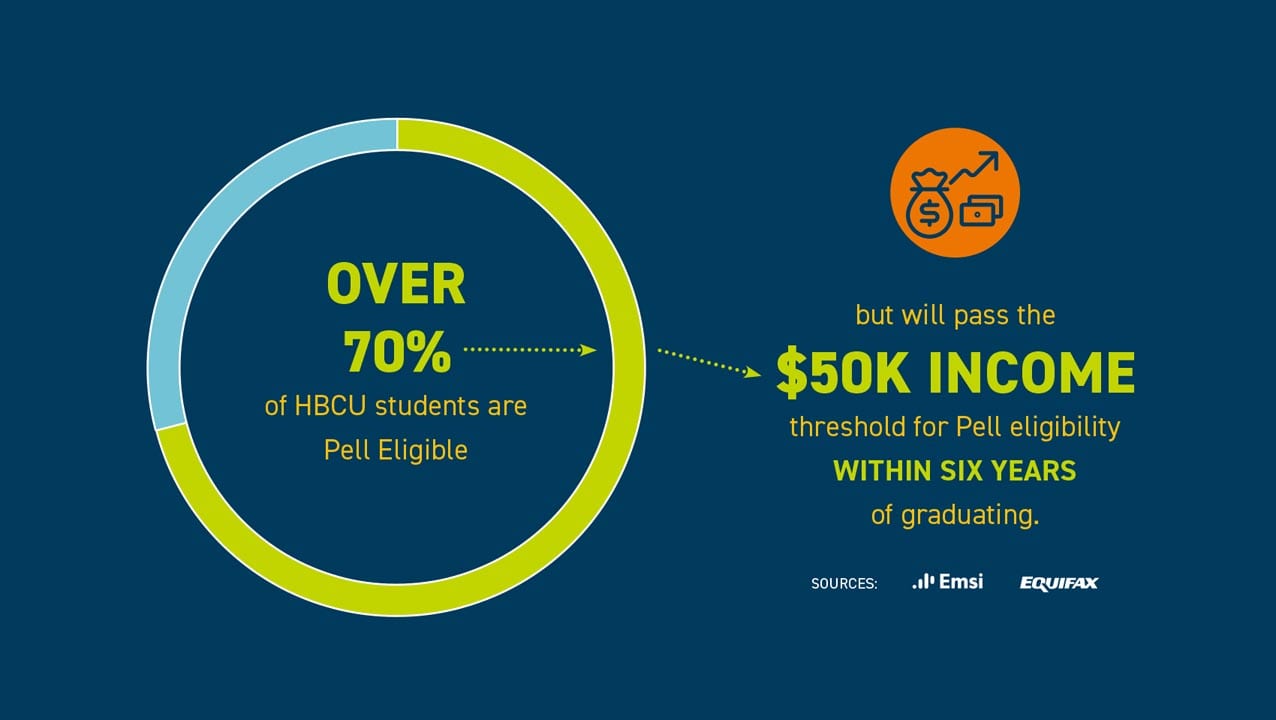
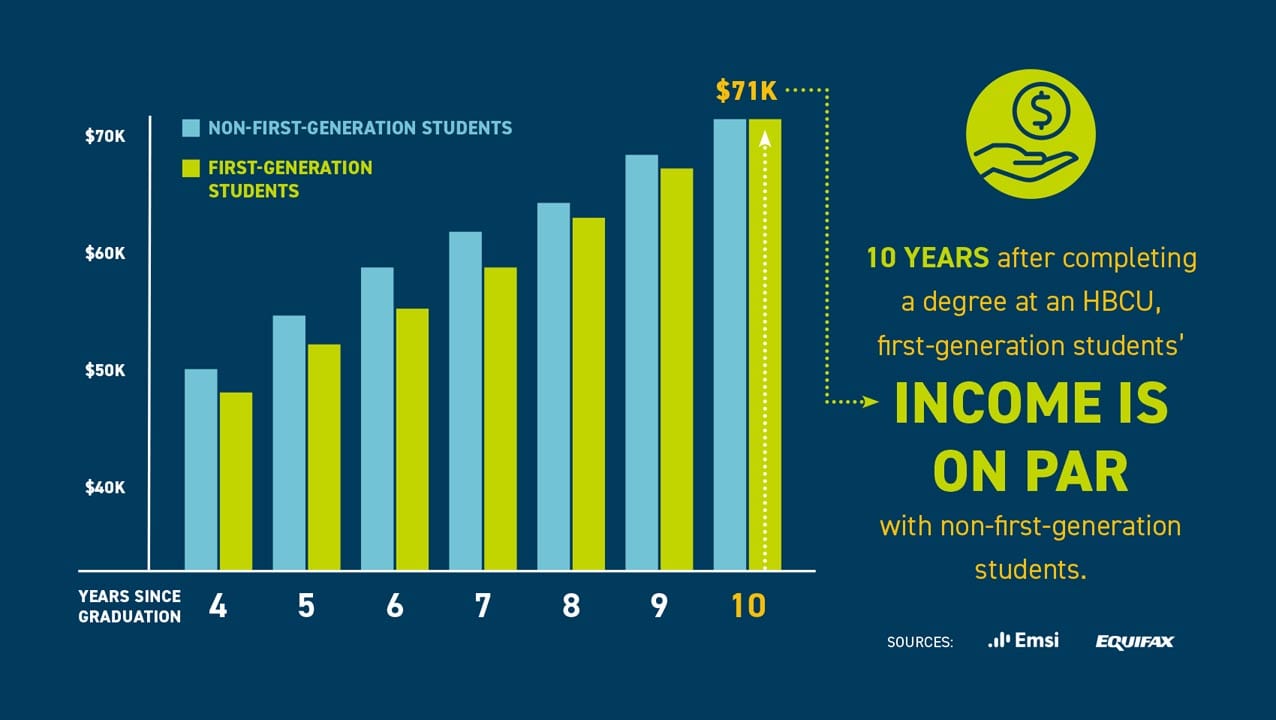
HBCUs graduate low-income students, many of whom are first-generation, at higher rates than predominantly White institutions (PWIs), and these same HBCU students report greater academic and social gains than their counterparts.
However, despite their role as a catalyst for educational, economic, cultural and societal gains for students of color, HBCUs continue to lag behind in public awareness, critical financial resources and overall support. The HBCU Effect™ is changing the narrative on HBCUs and offers evidence-based research that can support the legitimacy and success of HBCUs to the public rather than leaning entirely on anecdotal evidence as has been the case in the past. A recent UNCF workforce alumni study revealed that HBCU students are very satisfied with their HBCU support networks during their time on campus and after graduation while they were pursuing opportunities in the job market. “We seek to build upon the findings from this study through deeper inquiry to understand the collective HBCU experience and specific factors that contribute to students’ success while enrolled and after college to support accurate narratives about The HBCU Effect™,” said Njoku.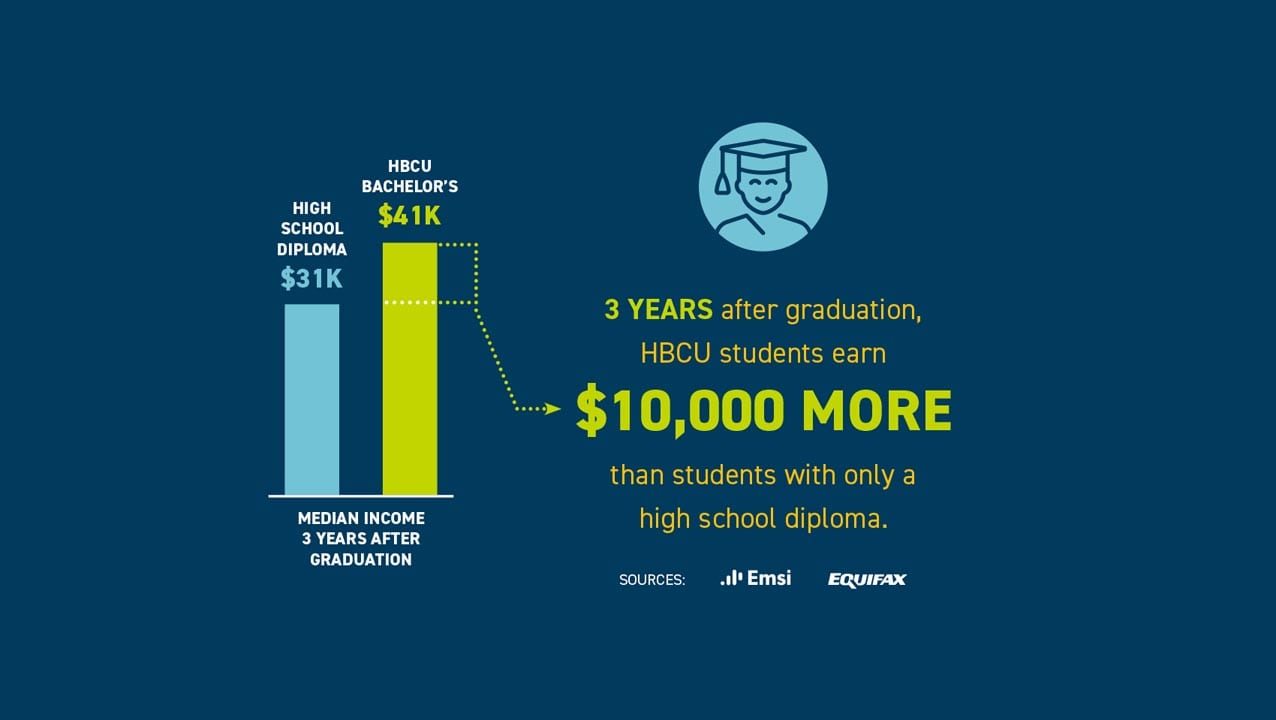 UNCF’s FDPRI has produced three major reports in The HBCU Effect™ series: “HBCUs Transforming Generations: Social Mobility Outcomes for HBCU Alumni,” “Culturally Relevant Practice: Implementation among Historically Black Colleges & Universities” and “HBCUs Punching Above Their Weight.” To read the individual reports, click here.
UNCF’s work to validate the purpose and significant impact of HBCUs shows that despite differences, better futures for all of us arise out of our common purpose—education—and goals to improve ourselves, our communities and our nation.
UNCF’s FDPRI has produced three major reports in The HBCU Effect™ series: “HBCUs Transforming Generations: Social Mobility Outcomes for HBCU Alumni,” “Culturally Relevant Practice: Implementation among Historically Black Colleges & Universities” and “HBCUs Punching Above Their Weight.” To read the individual reports, click here.
UNCF’s work to validate the purpose and significant impact of HBCUs shows that despite differences, better futures for all of us arise out of our common purpose—education—and goals to improve ourselves, our communities and our nation.
INNOVATE
UNCF Reimagines Online Education via the HBCUv™ Platform
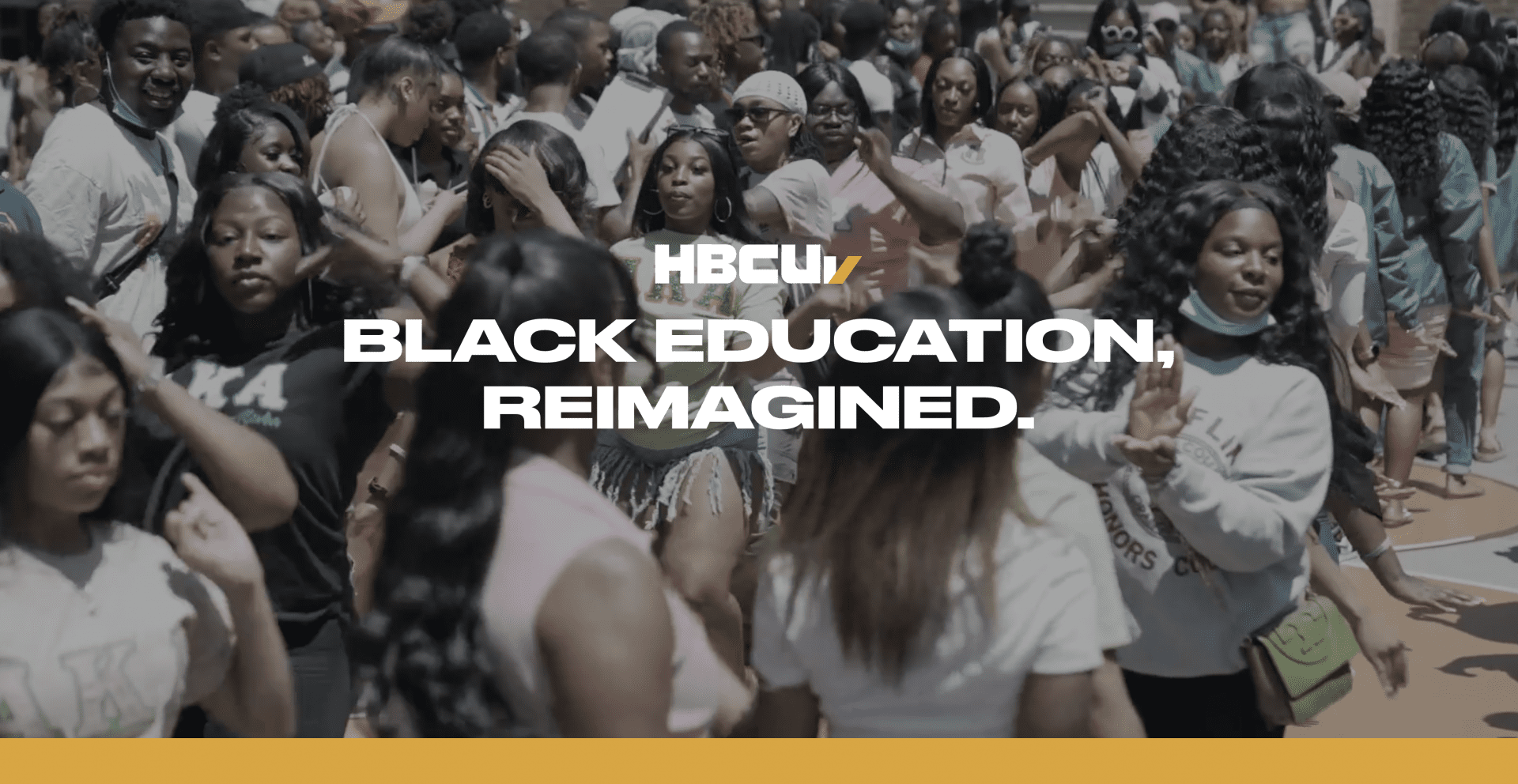
Most of these colleges and universities were forced to pivot from in-person classroom learning to virtual with limited financial resources. In response, UNCF trained more than 2,500 faculty to develop courseware for online classes, but quickly realized the limits of current online learning management systems (LMS).
“What we learned from the pandemic was that better training isn’t enough,” said Dr. Shawna Acker-Ball, vice president, UNCF Programs. “We need better tools and technology to deliver on the rich instruction and the strong culture of America’s HBCUs and extend this transformative experience for students online.”
Thankfully, just before the pandemic, UNCF began working on a new platform for community learning to put America’s HBCUs at the forefront of online education.
Called “HBCUv”, the shared platform is being designed and built to enable students, educators and staff to learn, develop and build community together from anywhere. HBCUv™ will provide best-in-class remote education, community engagement and career pathways to students seeking an HBCU education.
To help develop HBCUv™, UNCF selected Deloitte Digital’s Ethos, a new offering dedicated to using innovation to advance equity, sustainability and social welfare goals, to design and develop the platform in collaboration with UNCF and its partner institutions.
UNCF discovered that while current learning management systems do a good job at bringing education online, they makes it difficult for instructors and students to connect with each other and the communities that support student learning and engagement.
To address this challenge, HBCUv™ will have defining characteristics to ensure the experience is authentic and impactful. These include:
- Promoting Black Excellence: HBCUv™ will be home to the best Black courses taught by the best Black minds in America and serve as a beacon to young Black talent globally.
- Creating Black Futures: HBCUv™ will provide tools and technology that help Black students discover and design their path to a better future, including career planning and degree program matching.
- Driving Results with Data: HBCUv™ will leverage machine learning and big data to fuel predictive analytics on student performance and provide real-time feedback to instructors on lectures, assignments and assessments.
“HBCUv™ will do this by embedding the culture, community and commitment to Black excellence embodied by HBCUs into a unique online experience that will form the foundation of the future of Black education,” said Julian Thompson, director of strategy, UNCF Institute for Capacity Building.
UNCF partnered with nine initial HBCUs—Benedict College, Claflin University, Clark Atlanta University, Dillard University, Jarvis Christian University, Johnson C. Smith University, Lane College, Shaw University and Talladega College—to develop and pilot the HBCUv platform.
“The inclusion of HBCU students, faculty, staff and administrators as co-designers of the platform will be an attribute of its success,” said Dr. Valora Richardson, director of digital solutions and innovation, UNCF Institute for Capacity Building. “They know what they need, and we heard them.”
The development of HBCUv™ thus far has been made possible by funding from the Lilly Endowment, Citi Foundation, Bill & Melinda Gates Foundation and the Bank of America Charitable Foundation.
“This is just the beginning,” said Edward Smith-Lewis, vice president, strategic partnerships and institutional programs, UNCF. “Solving for the historic inequities that HBCUs and their students and staff face will take a sustained and concerted effort from a diverse coalition of nonprofit and for-profit partners.”
“For too long there has been a major innovation and investment gap between this nation’s HBCUs and other higher education institutions,” said Dr. Michael L. Lomax, president and CEO, UNCF. “HBCUv not only aims to close that gap, but also lead the way in online instruction and degree granting.”
The HBCUv™ prototype is expected in 2023.
INNOVATE
Inspiring Transformative Change in K-12 Education
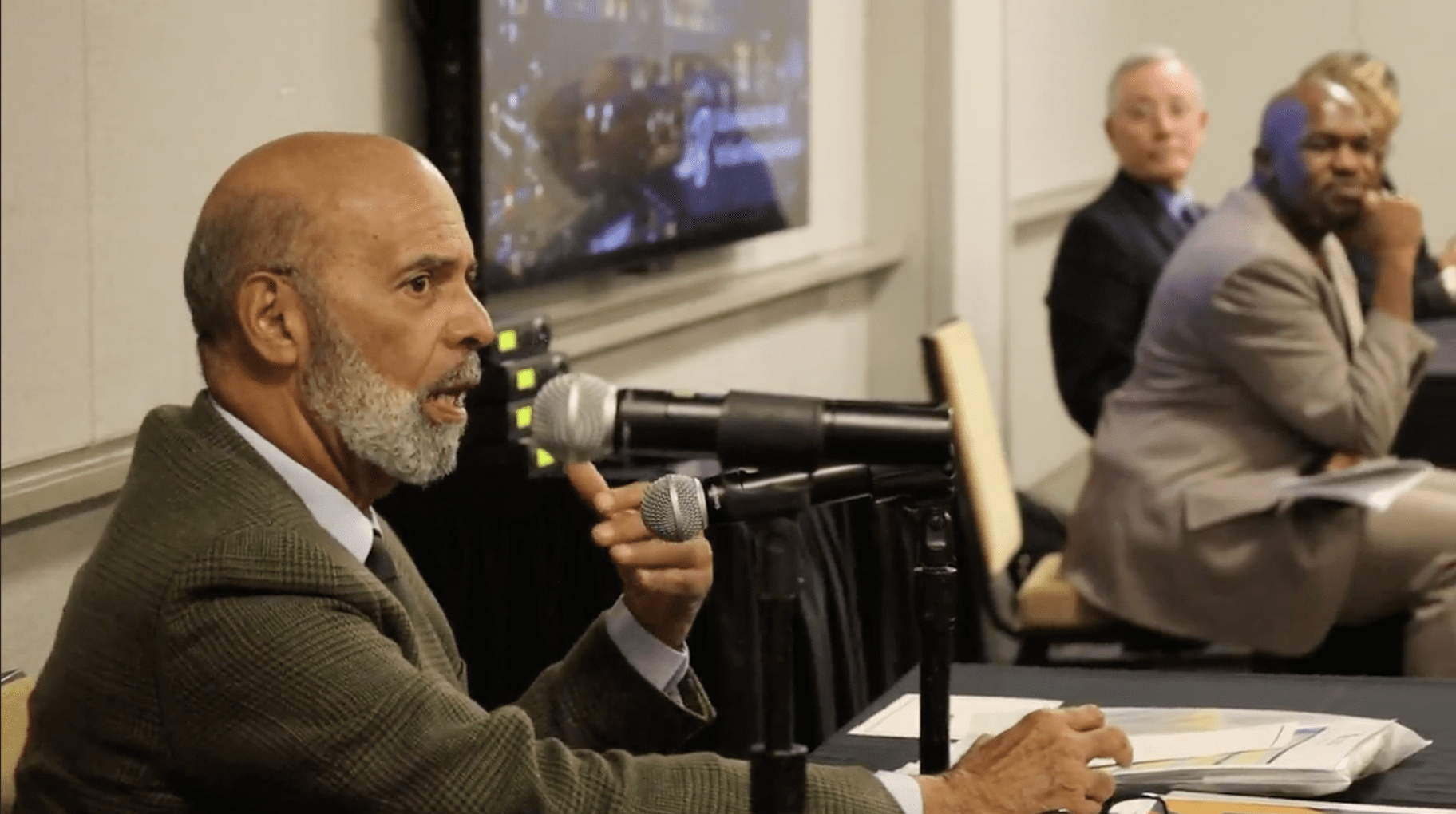
Part of the 2022 New Schools for Alabama Conference explored how to redefine the K-12 education system in the United States so students of color are not at a disadvantage when seeking a college degree upon graduation from high school. Dr. Michael Lomax, UNCF president and CEO, related how HBCUs are challenged by many students who lack skills needed to succeed in college due to systemic K-12 issues faced by Black students.
In a powerful keynote address, UNCF's president and CEO, Dr. Michael L. Lomax, underscored the critical need to transform outcomes in K-12 education to reshape the destiny of HBCUs. His speech resonated with a call to action, emphasizing that the future of HBCUs is intricately linked to the transformation of the educational landscape.
"We cannot change outcomes at HBCUs until we change outcomes in K-12 education," Lomax declared, setting the tone for a renewed era of opportunities for generations to come. He highlighted a remarkable shift, noting that African Americans, who once left the South due to a perceived lack of opportunity, are now returning, and Alabama stands at the forefront of this trend.
Addressing the persistent inequities in Alabama's educational system, Lomax announced UNCF's commitment to collaborate with Alabama HBCUs and charter schools. The objective is clear—create new and limitless opportunities for students whose futures are inextricably tied to the quality of education they receive.
Reflecting on the historical significance of HBCUs, Lomax shared a compelling narrative. After the Civil War, Black and White missionaries united in Alabama to build schools in Black communities. These institutions not only provided primary and secondary education but also became the bedrock for training Black teachers. HBCUs played a pivotal role in breaking the cycle of non-education, with graduates making a lasting impact.
Lomax shed light on an extraordinary education initiative of the 20th century—the brainchild of Booker T. Washington and Jewish philanthropist Julius Rosenwald. Together, they addressed Black illiteracy by establishing 5,000 one-room schoolhouses across the South. Lomax urged the charter school community to learn from this model, emphasizing the importance of community engagement and ownership.
"We don't have to do this the way it's been done before. We don't have to do what other cities have done," Lomax asserted.
He called for a unified voice in advocating for community needs, urging a unique approach deeply embedded in collaboration with institutions connected to the community. Highlighting the partnership potential, he emphasized that charter schools need HBCUs, and HBCUs need charter schools. The collaboration extends to developing K-12 schools on HBCU campuses, fostering college-ready students through early college admission, and addressing the critical shortage of Black teachers—a pivotal initiative for community empowerment. Lomax stressed the importance of equipping communities with educators who understand their unique challenges and can serve as role models, contributing to the broader goal of creating a positive and impactful educational environment.
As the keynote concluded, Lomax expressed UNCF’s eagerness for collaboration, envisioning a new era of education, innovation and opportunity. The movement is fueled by determination—to address inequities, eliminate disparities and provide the education that every child deserves for success in the next generation.
Lomax’s speech set the stage for a pivotal session at the NSFA Conference, where UNCF and college and university leaders engaged in profound discussions on the path for a redefined K-12 education system. Panelists included Lomax, Dr. Gregory Vincent (Talladega College president), Dr. Maria Lumpkin (Stillman College vice president of strategic initiatives and chief transformation director), Bobbie Knight (Miles College president) and Dr. Ken Tucker (University of West Alabama president). The session delved into the issues facing K-12 education and explored solutions.
Lomax provided context to challenges faced by HBCUs, seeking insights into the real issues affecting students entering higher education. Vincent shared perspectives on overcoming challenges within his administration, highlighting the complexities and potential roadblocks. Tucker shared a unique perspective implementing a charter school on a college campus, offering practical insights into addressing challenges. Knight engaged in a visionary exercise, contemplating unconstrained solutions to the hurdles faced by young leaders.
Through innovative efforts being undertaken by UNCF to foster real change in the K-12 landscape, this conference became a launchpad for a new era in education—a collaborative and inclusive era that recognizes the potential of every student.
INSPIRE
Bennett College is Preparing Women of Color to Lead with Purpose, Integrity and a Strong Sense of Self-Worth
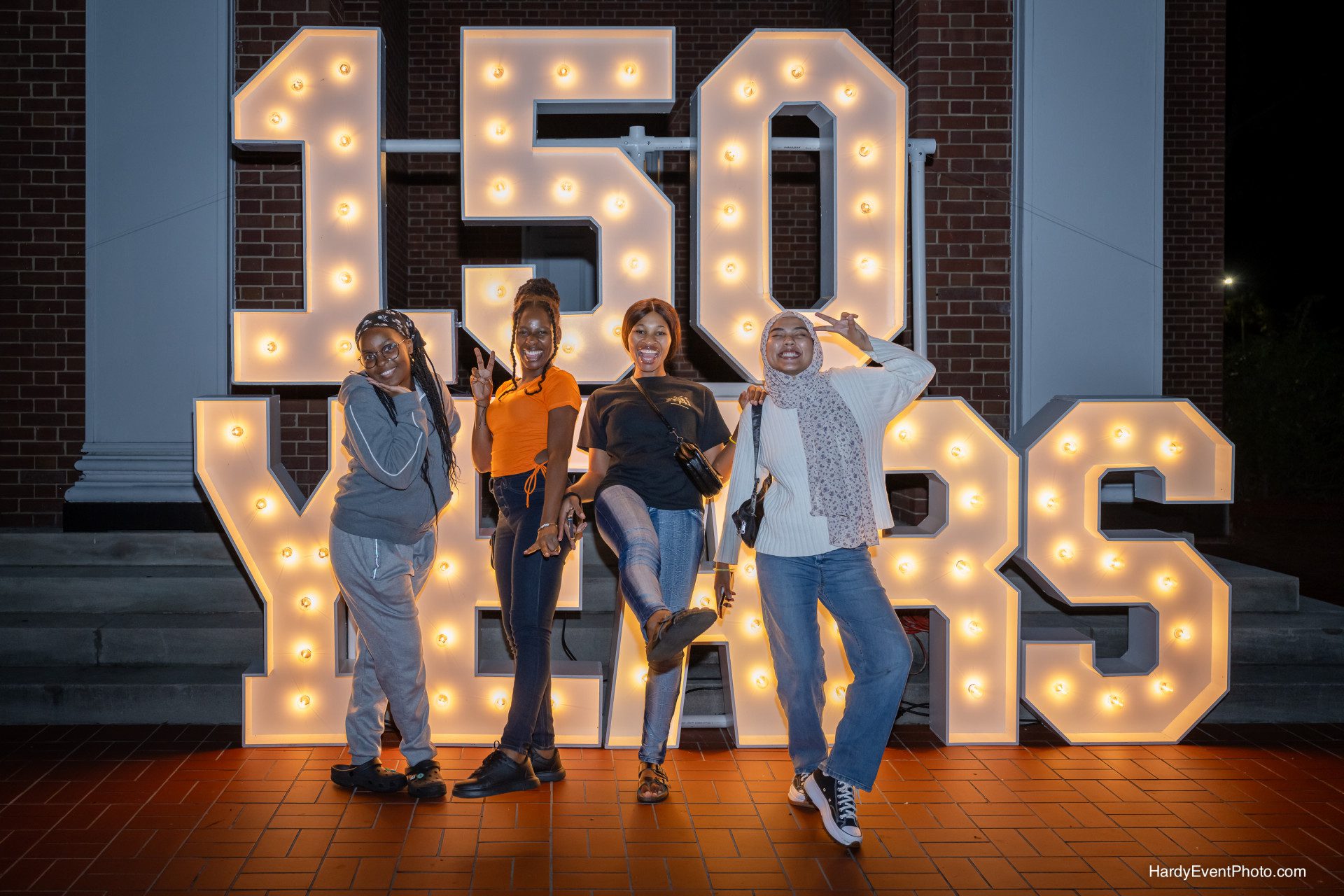
Bennett College students celebrate its 150th anniversary during 2023.
On the national front, Bennett ranked first in social mobility among liberal arts colleges in 2022 and was rated a Best College for Social Mobility in 2022-2023 by U.S. News & World Report, as well as receiving a designation as a Fulbright HBCU Institutional Leader for multiple years.
A United Methodist Church-affiliated institution, Bennett has accreditation status with the Transnational Association of Christian Colleges. With those outstanding credentials, Bennett College is making an impact and helping to secure better futures for us allINSPIRE
Why I Serve: Dr. Blondean Davis, a Visionary Educator with a Passion for UNCF and HBCUs
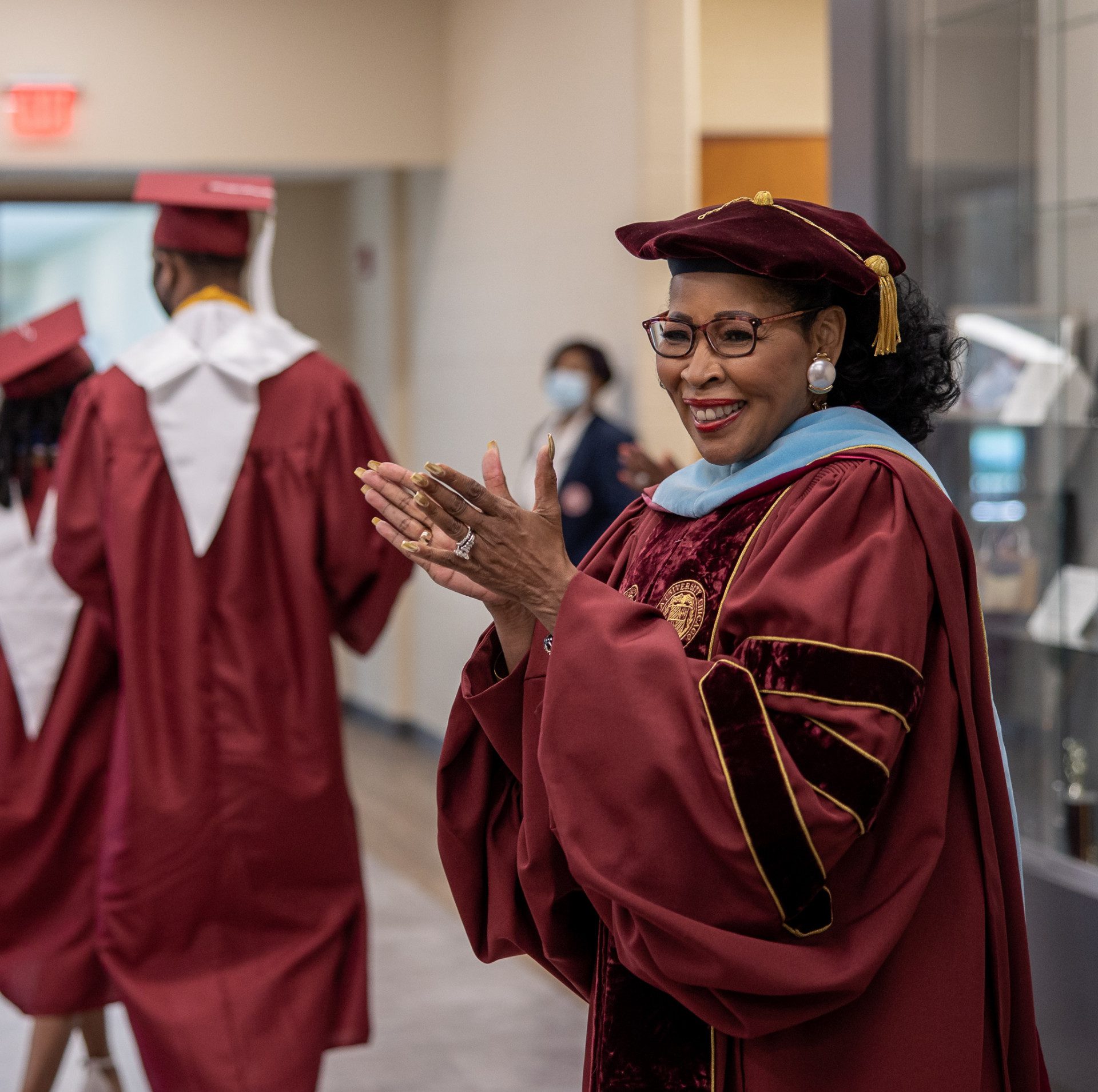
Dr. Blondean Davis has helped raise more than $10 million in scholarship funds for UNCF-supported students.
The former chief of schools and regions of Chicago Public Schools (CPS), Davis was responsible for the management of seven regions and 601 schools. She served as the chairperson for the CPS employee campaign for UNCF. Through those efforts, she helped to raise more than $10 million that helped more than 4,000 students to receive scholarships to attend college.
After retiring from CPS after 30 years of service, Davis’s passion for educating children led her to become the superintendent of Matteson School District 162 in 2002 and in 2010 to take on the challenge of opening a new high school.
Davis is the founder and CEO of the predominantly African American Southland College Prep Charter High School, the only charter high school to earn the state of Illinois’ highest designation of “exemplary.” The school has 100% college acceptance for its 10 graduating classes, whose members earned nearly $350 million in scholarships.
Recognized nationally for her vision and leadership in education reform and raising student achievement levels, Davis is possibly the only African American woman to lead a public elementary school district while also acting as a pro bono CEO of a successful charter high school.
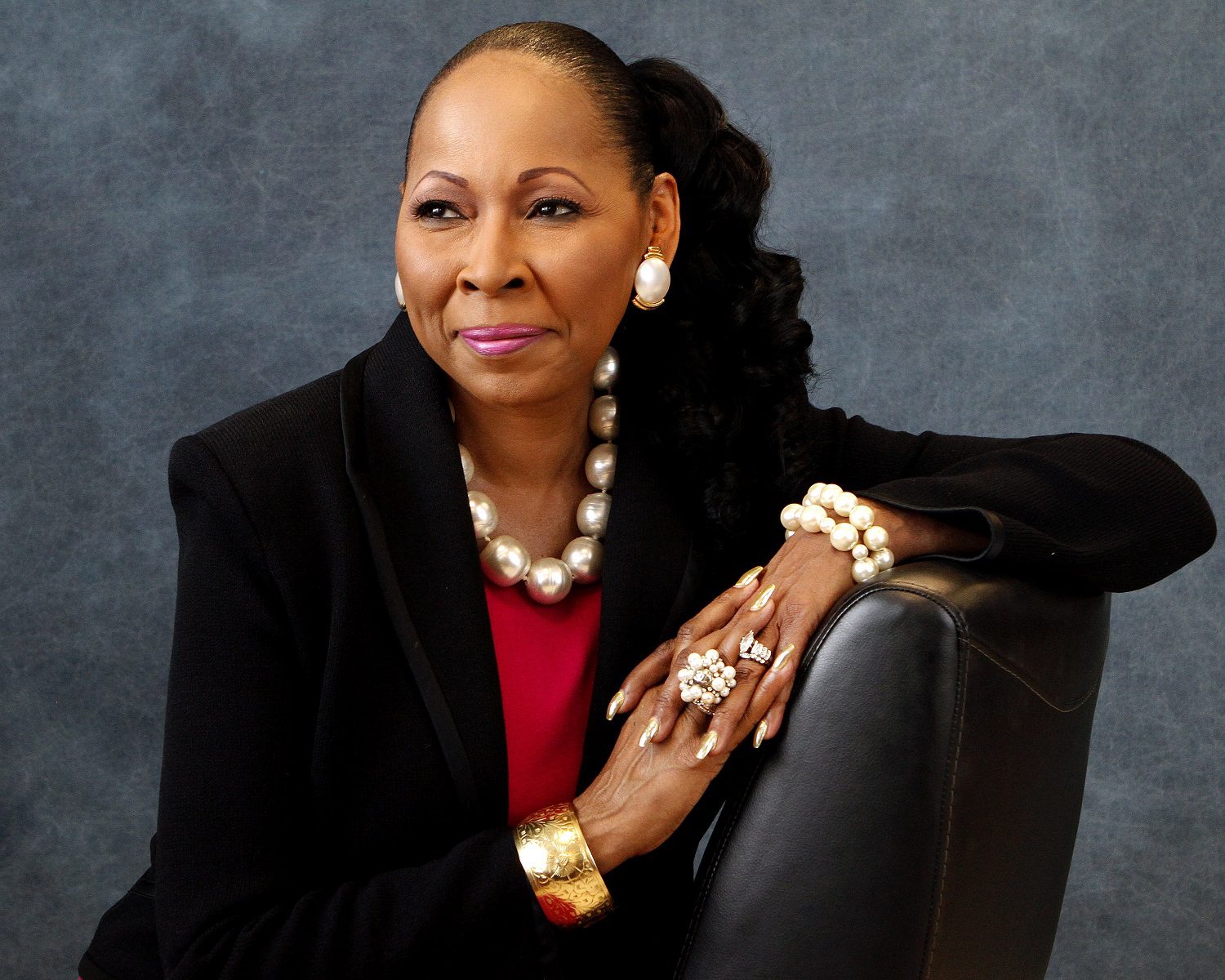
Davis is a member of the board of trustees of Tougaloo College in Mississippi. In 2023, she organized suburban school district superintendents to join forces with UNCF to sponsor a scholarship gala that raised more than $200,000.
The success of UNCF, its member HBCUs and all HBCUs is driven by committed and conscientious supporters like Dr. Blondean Y. Davis, who firmly believe that “A mind is a terrible thing to waste”® and work to ensure better futures for us all.
INSPIRE
Hip Hop Raised more than a Half-Million Dollars in Houston to support HBCU Students

MC Lyte, renowned pioneer female rapper, rocks the crowd at 2022 Houston UNCF “A Mind Is…”® Gala, performing for 600 guests
The night was strategically themed “Hip Hop You Don’t Stop” to appeal to a younger generation of philanthropists who grew up listening to a genre of music that resonates with so many.
Local legends filled the house at the event on Nov. 19 at the Houston Hilton Americas Hotel. Spelman College graduates Gaynell Floyd Drexler and Heidi McDonald Smith served as gala co-chairs. Dr. Alvia Wardlaw, curator and director, University Museum at Texas Southern University, also a Scholarly Advisory Committee member for the Smithsonian National Museum of African American History, was the gala’s honorary chair.
Additional honorees included Howard University graduate Nicholas Perkins, chairman, president and CEO of Perkins Management Services Company and Black Titan Investment Corporation and the first African American to own a national hamburger franchise; Morehouse graduate Rommel Quarterman, executive managing partner at Johnny Carrabba Family Restaurants and the proud father of a current Spelman College rising junior; and Dillard University graduate Dr. Ruth J. Simmons, president of Prairie View A&M University, also the first African American president of an Ivy League institution.
As with any highly sought out event, the night included the who’s who of Houston, all joining UNCF President and CEO Dr. Michael Lomax for a rousing night of hip hop history as funds were raised to support the UNCF mission.
U.S. Rep. Sheila Jackson Lee (D-TX), Houston Mayor Sylvester Turner and Houston City Council Member Tiffany Thomas were also in attendance. Huston-Tillotson University’s (HTU) reigning Miss UNCF Surrender Lockridge and other HTU students networked and mingled with guests during the reception and dinner.
Major event sponsors were Waste Connections, H-E-B, ConocoPhillips, Brentwood Baptist Church, Wells Fargo, Enterprise Holdings Foundation, NABORS, and Benny and Nikki Agosto, Jr.
Highlights included the slow, loud and banging 1993 Cadillac Fleetwood parked outside the ballroom, a digital-visual storyboard filled with images showcasing hip hop culture and artists, professional break dancers from Break Free Houston, who gave a glimpse of what can be expected at the 2024 Olympics in Paris, and a mic-dropping performance by the one and only MC Lyte.
The UNCF Houston Area Office rocked the party by surpassing its half million-dollar goal before the party ballroom doors even opened. Going into the event the team led by Area Development Director Zarinah Poole, Development Director Kaylon Beck and Administrative Assistant Jewell Bass was also supported by Mayor Turner and Houston UNCF Leadership Council member Bryce Kennard, also a graduate of Morehouse College, in securing night-of donations from the attendees.
The Houston Hip Hop Gala is an outstanding example of how galas, masked balls and other vital UNCF fundraising activities support HBCUs and their students, ensuring better futures for all Americans.
INVEST
UNCF and Gray Foundation Partnership Provides a Pathway for More New York City Students to Attend HBCUs
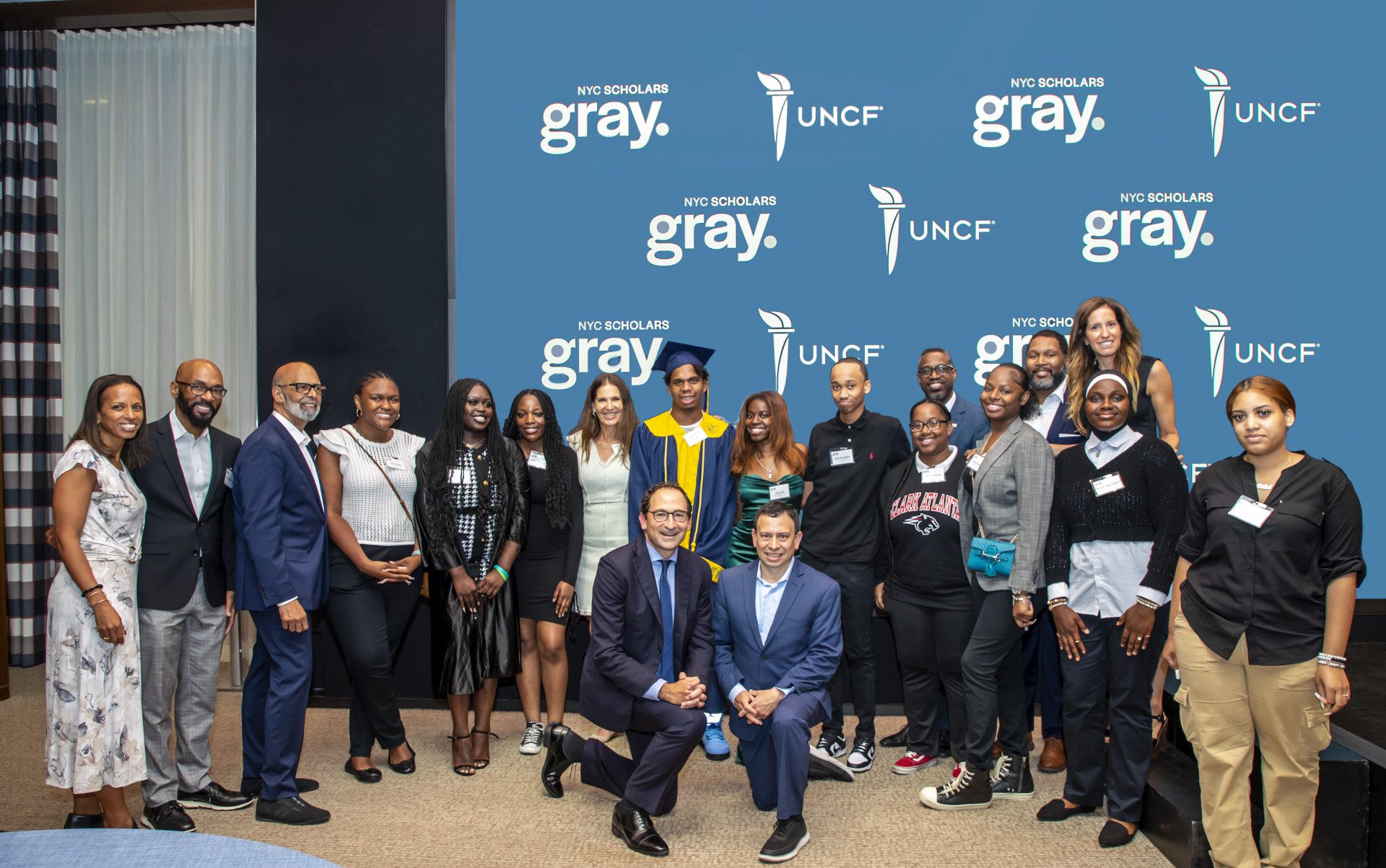
The Gray Foundation welcomes the newest Gray NYC Scholars at a reception at the Blackstone Event Center in New York City.
Funded with a $3 million grant from the Gray Foundation, UNCF selected 11 scholars from among 79 New York City (NYC) students who were nominated by the Gray Foundation’s 27 college access partners. Together, the organizations provide vital assistance to thousands of students in the college application process. Including this new collaboration, the foundation has now committed more than $55 million to improve college access and success for NYC youth.
The goal of the UNCF Gray NYC Scholars Program is to increase awareness of, access to and graduation from HBCUs for economically disadvantaged NYC students who might not otherwise have considered these schools. Each scholar will receive an annual scholarship of up to $50,000 per year to help cover tuition, room, board and other related expenses.
Generous renewable scholarship awards allow students to concentrate their time and energy on academic activities, without the distraction of financial concerns. But the student support does not end there. The scholarship program’s financial support is complemented by wraparound student support services that provide frequent, intentional engagement with students essential for them to successfully complete college and graduate.
Program services include a college success coach whose regular engagement and communication with scholars supports their academic progress and professional development; a mentor network to provide HBCU alumni mentors for these HBCU-bound students; and an online learning community that provides valuable online resources, tools and information designed to empower and prepare scholars for academic and personal success.
The wraparound support services have proven critical to enabling students to overcome challenges that limit successful academic outcomes—especially among students from vulnerable populations, such as low-income, first-generation college students.
In June 2023, the Gray Foundation hosted a reception in New York City for its Gray NYC Scholars, including the inaugural cohort of UNCF Gray NYC Scholars. The scholars along with members of their families and representatives from the college access organizations met with Gray Foundation co-founders Mindy and Jon Gray, as well as UNCF President and CEO Dr. Michael Lomax.
“We’re excited to deepen our partnership with UNCF and build on our significant investment in expanding college access for New York City students. And we couldn’t be more thrilled to welcome this new cohort of accomplished and deserving students into the Gray NYC Scholars community and help them pursue their educational aspirations at the HBCU of their choice. We are confident that with the backing of UNCF, with its impressive track record of supporting student success, these scholars will achieve excellence in college and beyond,” said Jon and Mindy Gray.
“For too long, HBCUs, which have played such an outsized role in producing this country’s Black middle class, have been out of reach, and in some cases off the radar, for low-income students in New York City. This program puts HBCUs within reach and broadens the realm of viable college options so that students can choose the school that is the best fit for their interests and needs,” said Gray Foundation President Charissa Fernández.
Together, UNCF and the Gray Foundation are empowering more students to achieve better futures to serve their communities and the nation.
INVEST
UNCF, Thurgood Marshall College Fund and Partnership for Education Advancement Announce Historic Collaboration to Improve Socioeconomic Outcomes for Black Communities
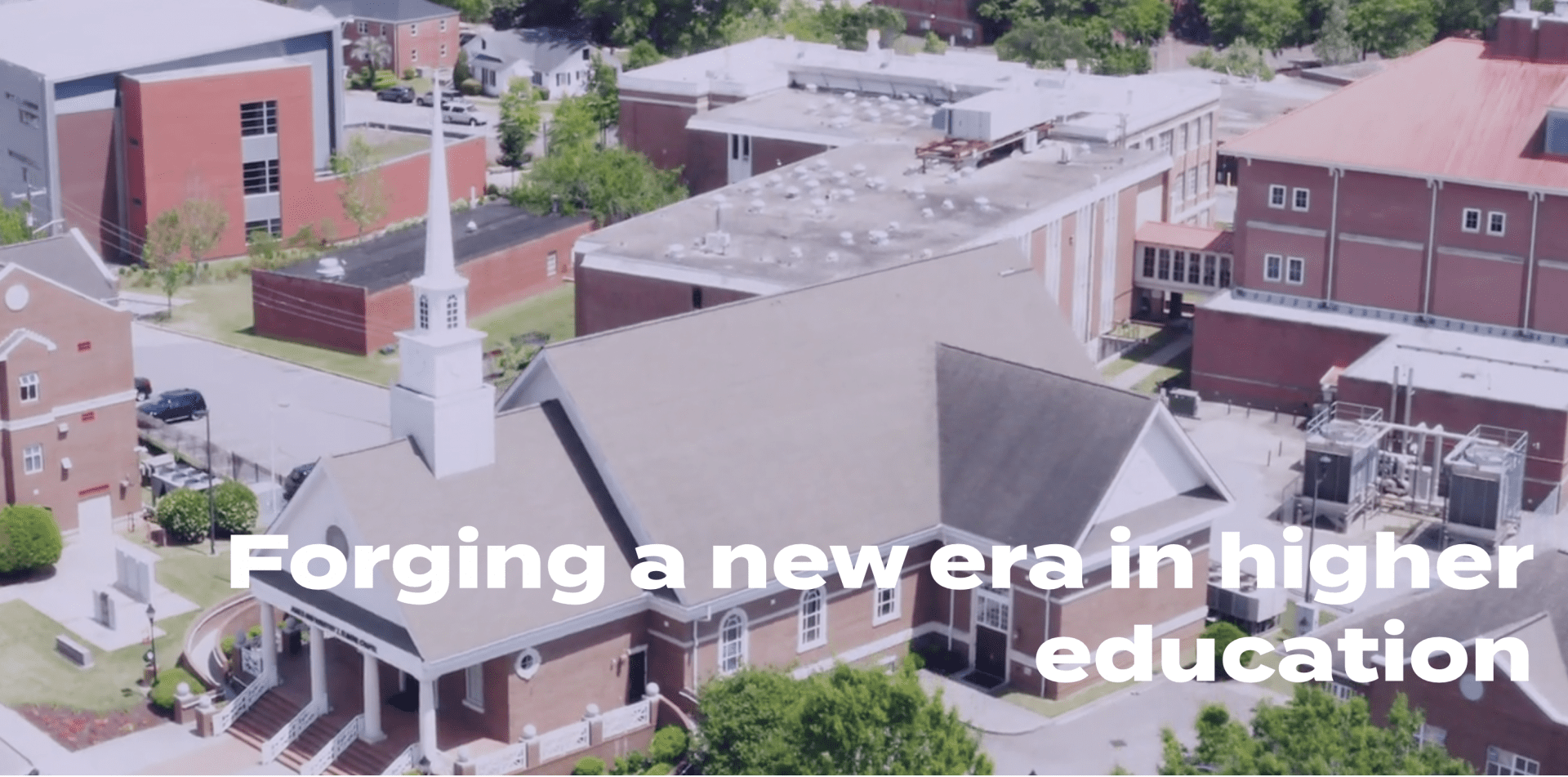
To assist with the efforts funded by Blue Meridian Partners, UNCF’s Institute for Capacity Building launched a new website to provide support to the HBCU Transformation Project effort.
Dubbed the HBCU Transformation Project, this first-of-its-kind collaboration aims to increase HBCU health and sustainability, improve student outcomes in retention and graduation rates, expand enrollment and increase capacity building with faculty and staff. Flexible support from the coalition focuses resources to highest priorities at each institution.
The overall initiative is structured around six interdependent sub-initiatives that work in service of supporting all HBCUs:
- Institutional improvement and innovation via TMCF, UNCF and the Partnership for Education Advancement
- Institutional and intermediary capacity building
- Increased public funding for HBCUs to rectify historic inequities
- Private capital campaign for endowments and sustainable reserves
- Community and regional economic development partnerships
- Reorienting the narratives surrounding HBCUs toward their outsized impact on social and economic mobility outcomes
Blue Meridian Partners, a pioneering philanthropic model for finding and funding scalable solutions to problems that limit economic and social mobility for America’s young people and families in poverty, committed an initial $60 million to support the HBCU Transformation Project.
Although they represent just 3% of all higher education institutions, HBCUs produce nearly 20% of all African American college graduates. HBCUs have produced more than 1 million associate, bachelor's, master's and doctoral degrees combined since 1984.
HBCUs produce 40% of all Black engineers, 40% of Black Congress members, 50% of all Black lawyers, 50% of all Black doctors, and 80% of Black judges. These professions are critical for closing the wealth gap between Black and White workers.
While HBCUs overproduce relative to their better-resourced counterparts, they have remained underfunded. Historical underfunding has led to a myriad of financial issues for HBCUs, particularly much smaller endowments relative to their peers.
“Our country has under-invested in HBCUs, which have a proven track record for unlocking student potential, driving socioeconomic mobility and serving as significant community assets,” said James Runcie, president, Partnership for Education Advancement.
Recent data from McKinsey & Company shows that investing in HBCUs would profoundly affect the U.S. economy and help fill the social and economic gaps Black Americans experience. HBCUs are uniquely positioned to foster such advancement given their assets, experience and cultural and historical significance.
“This collaboration offers a powerful opportunity to drive positive socioeconomic impact,” said Dr. Harry L. Williams, president and CEO, TMCF. “We are proud to partner on this unique, capacity-focused strategy that brings together HBCU institutional relationships and the capacity building experience of TMCF, UNCF and the Partnership for Education Advancement.”
“UNCF and Thurgood Marshall College Fund have worked together for many years, and this collaboration is a continuation of our efforts to amplify support for the needs of HBCUs and the students they serve,” said Dr. Michael L. Lomax, president and CEO, UNCF. “Blue Meridian Partners' support is very important and will significantly enhance the HBCU innovation and transformation work that UNCF’s Institute for Capacity Building team has been pioneering for nearly two decades. This high-profile campaign will make the case to donors and to the government to elevate the profile of HBCUs and raise the support they deserve.”
“HBCUs have long overperformed as engines of opportunity," added Jim Shelton, Blue Meridian Partners chief investment and innovation officer. “With this investment, we aim to significantly strengthen these institutions and student success at scale, contribute to closing racial gaps in access to opportunity and boost economic mobility and wealth-building among Black people and communities now and for generations to come.”
The initiative will be executed using a cohort model of select institutions. The inaugural participating HBCUs are:
INVEST
Ralph Lauren Corporation and The Ralph Lauren Corporate Foundation Help Light the Way for HBCUs Students

Ralph Lauren’s Black Advisory Council launched its Ralph Lauren Pin of Solidarity in late 2021 to customers. One hundred percent of the profits are given to UNCF to fund the new scholarship program.
